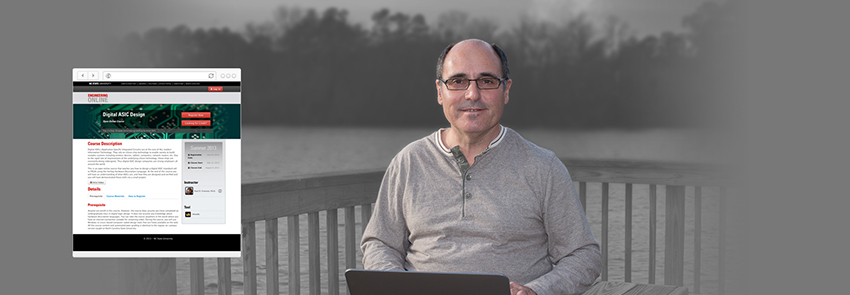
The OOC Experiment: ECE 520 Digital ASIC Design
DELTA staff teamed up with Dr. Paul Franzon, professor of electrical and computer engineering, to create NC State’s first large enrollment, open online course (OOC)–ECE 520: Digital ASIC (Application Specific Integrated Circuits) Design.
A 10-week course offered in summer 2013, ECE 520 was project-based with an emphasis on design practices and underlying algorithms. Students were introduced to a variety of concepts, including timing-driven design, low-power design, design-for-test and ASIC applications.
Taught concurrently as an on-campus course, the OOC version of the course ran in summer 2013, with 688 students enrolled from around the world. Students in the OOC course who achieved a grade of at least 80% could opt to earn course credit for a relatively small fee.
Prior to running the OOC course, Dr. Franzon had partnered with DELTA to create a flipped version of his existing ECE 520 course. The course flip involved creating 20-minute video presentations, followed immediately by a brief quiz to help students gauge their understanding, as well as homework assignments and pencasts. In the flipped class, face-to-face class sessions could then focus on answering questions and providing active learning class exercises.
With much of the instructional design work for an online course already accomplished through the flip, DELTA support for the OOC version focused more heavily on providing instructional technology support for the large online class.
Instructional Challenges
Besides the obvious challenge of designing NC State’s first OOC, the project required attention to more specific challenges, such as:
-
Providing technological and pedagogical support for a significantly higher number of students
-
Designing for global access and scalability
-
Creating and hosting the course independent of a larger MOOC (massive open online course) platform, such as edX or Coursera
Highlights and Solutions
DELTA staff and Dr. Franzon worked together to develop effective solutions to the OOC challenges:
- Content delivery: Uploaded course videos to YouTube, allowing students to stream videos smoothly (also hosted course videos secondarily on NC State servers, using WolfWare Classic, for students in countries with blocked YouTube access.
- Peer accountability: Used the Moodle Workshop activity to facilitate peer review of assignments and coursework, and included group activities to allow students to interact with one another and build community.
- Immediate feedback: Used Moodle Quizzes to provide students immediate feedback on their quizzes, helping them stay on track through the course and gauge their understanding of course concepts.
- Accessibility: Prepared closed-captioning and transcripts for all videos to enable non-native English speaking students to grasp course material more effectively, and converted all course exercises to run on publicly available computer-aided design (CAD) tools.
- Technological support: Used Moodle, Blackboard Collaborate and Mediasite to host course elements, and created a separate Moodle stack to host the course and avoid overloading the NC State servers.
Related Links
Read more about the ECE 520 OOC experiment at NC State in the DELTA Annual Report 2012-2013.
Learn more about MOOCs and OOCs at NC State in the DELTAwire article, “What Have We Learned?: A Recap of ‘MOOCs and OOCs at NC State’ Seminar.”
See reports and resources on MOOCs in the DELTAwire article, “MOOCs and Online Learning: Recent Reports and Resources.”
For more information about DELTA services, please contact LearnTech.